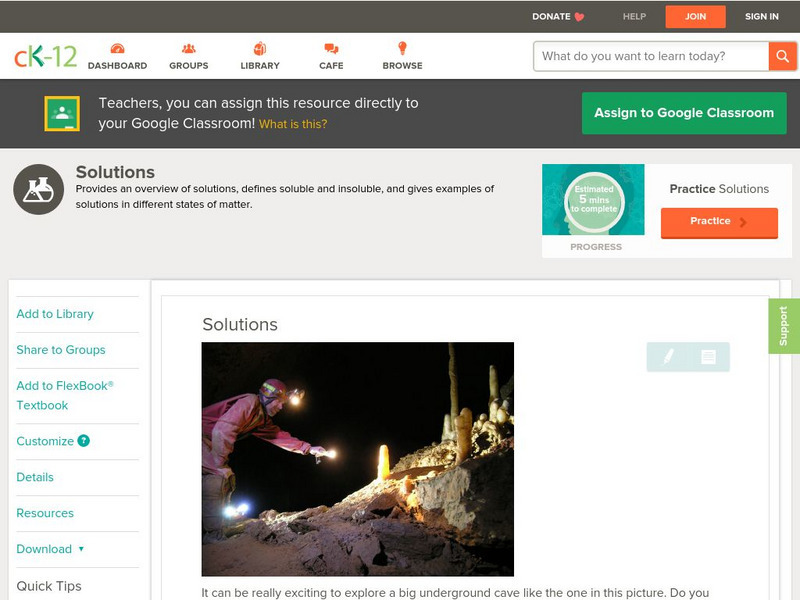Hi, what do you want to do?
Curated OER
Crime and Young People
Students read the story, "Police in Schools". They view a list of common offences committed by young people and identify the victims of these offences and consider how the offence would affect those people.
Curated OER
What's the Matter? Where Did it Go?
Eighth graders analyze questions posted on a large poster in the room and work in groups to record their response to the question on paper, rotating to the next question after two minutes have passed. They review the characteristics of...
Curated OER
Properties of Matter
In this science worksheet, students find the words related to matter and the answers are found by clicking the button at the bottom of the page.
Curated OER
Chemical Bonding and Shapes of Molecules
In this chemical bonding worksheet, students review the different types of bonds and calculate the number of valence electrons in molecules. This worksheet has 11 matching and 15 multiple choice questions.
Curated OER
Polymerization Experiments
Students explain the process of polymerization. In this chemistry lesson, students produce carboxylesterase in the lab. They test its effectiveness in removing the by-product odor.
Curated OER
Structure of the Earth System
Eighth graders describe the steps in the water cycle. They discuss factors that affect runoff and explain the differences between stalactites and stalagmites. They discover the importance of ground water.
Curated OER
Moore S Word Search Puzzle
For this literacy worksheet, learners find the words that are in the word search puzzle that focus upon the vocabulary that is from the theme of the sheet.
Curated OER
Ice Cream
High schoolers explore the concept of the colligative property. Through experimentation, students lower the freezing point of a liquid in order to create a solid by using household ingredients to create ice cream.
Curated OER
Flower Pigments
Students experiment with Thin Layer Chromatography to separate pigments found in flower petals.
Curated OER
Microscopes and Crystals
Students observe crystals under the microscope. In this science lesson plan, students compare how the crystal look like using their eyes, hand lens and microscope. They identify the type of crystal based on the amount of light they allow...
Curated OER
Isolation of Synthetic Chemicals from Plant Leaves
Students isolate and identify a dye, which represents a synthetic pesticide, from plants.
Curated OER
How Do I Get a Pure Sample of the Molecules I Make?
Students initially engage in online research and consult print materials to identify a compound to produce. Once a selection has been made, individually, students conduct lab experiments to isolate substances. The end product is a...
Curated OER
Water Chemistry
Students engage in a lesson that is concerned with the concept of water chemistry. They conduct research using a variety of resources. Students also consider an experiment to observe how water has the abiility to exist as three different...
Curated OER
Particle Theory of Matter
In this science word search worksheet, students identify and locate words in a puzzle that relate to particle theory of matter. There are 24 words to locate in the puzzle and spell correctly.
Curated OER
Salt & Sand
In this science worksheet, students find the terms that are related to the concept of the ocean salt and sand. The answers are found by clicking the link at the bottom of the page.
Curated OER
Science Words
In this general science worksheet, students find 32 science words reviewing states of matter and types of substances. Students may self correct by selecting the link at the bottom of the page.
Curated OER
Ions in the Environment
Learners explain the importance of the five main biogeochemical cycles. In this chemistry lesson, students discuss how ions are transported in the environment. They design an experiment to collect data on eutrophication.
Curated OER
Designing a Flotation Strategy for the Purification of Recycling
Twelfth graders work in teams to design a method of recycled plastics purification by flotation. They base their design on the concept that different kinds of plastics have different densities and keep overall costs and purification time...
Georgia Department of Education
Ga Virtual Learning: Physical Science: Solutions Chemistry
Through interactive puzzles, informational text and video clips, students will investigate the properties of solutions.
CK-12 Foundation
Ck 12: Physical Science: Properties of Solutions
[Free Registration/Login may be required to access all resource tools.] How solutes affect solvents, the freezing point depression and boiling point elevation.
CK-12 Foundation
Ck 12: Physical Science: Solutions
[Free Registration/Login may be required to access all resource tools.] What a solution is and its different parts, definition of soluble and insoluble. Solutions in different states of matter.
Utah Education Network
Uen: Finding Solutions
Students will use the terms solute and solvent in describing a solution. They will sketch a solution at the particle level and design and conduct an experiment to determine the factors (e.g., agitation, particle size, temperature)...



























